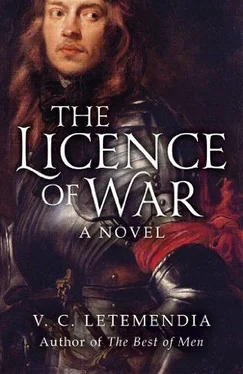Claire Letemendia - The Licence of War
Здесь есть возможность читать онлайн «Claire Letemendia - The Licence of War» весь текст электронной книги совершенно бесплатно (целиком полную версию без сокращений). В некоторых случаях можно слушать аудио, скачать через торрент в формате fb2 и присутствует краткое содержание. Год выпуска: 2014, ISBN: 2014, Издательство: McClelland & Stewart, Жанр: Исторические приключения, на английском языке. Описание произведения, (предисловие) а так же отзывы посетителей доступны на портале библиотеки ЛибКат.
- Название:The Licence of War
- Автор:
- Издательство:McClelland & Stewart
- Жанр:
- Год:2014
- ISBN:978-0-7710-4674-2
- Рейтинг книги:3 / 5. Голосов: 1
-
Избранное:Добавить в избранное
- Отзывы:
-
Ваша оценка:
- 60
- 1
- 2
- 3
- 4
- 5
The Licence of War: краткое содержание, описание и аннотация
Предлагаем к чтению аннотацию, описание, краткое содержание или предисловие (зависит от того, что написал сам автор книги «The Licence of War»). Если вы не нашли необходимую информацию о книге — напишите в комментариях, мы постараемся отыскать её.
The Licence of War — читать онлайн бесплатно полную книгу (весь текст) целиком
Ниже представлен текст книги, разбитый по страницам. Система сохранения места последней прочитанной страницы, позволяет с удобством читать онлайн бесплатно книгу «The Licence of War», без необходимости каждый раз заново искать на чём Вы остановились. Поставьте закладку, и сможете в любой момент перейти на страницу, на которой закончили чтение.
Интервал:
Закладка:
“Of course, my lord,” said Laurence, imitating Violet’s reverential tone.
IV
“Mr. Pym has been at the Commons all day, sir,” the secretary said to Veech. “Do not be long with him. He is very tired.”
“It was he who called me here to Derby House,” said Veech, and strode into John Pym’s chamber.
Pym was huddled in an armchair by a roaring fire, a blanket over his knees. On a table at his elbow lay an untouched plate of bread and meat, a vial, and a horn cup. Sweat shone on his forehead, and the pain in his bloodshot eyes told Veech that he was suffering from a bout of the sickness rumoured to afflict him more and more. It might soon kill him. And who then would take up the burden he had assumed: of solving the disputes in Parliament between moderates and radicals, and among the religious sects; of forging an alliance with the dour, canny Scots; and of levying funds for what so many viewed as a traitorous, ungodly rebellion against their anointed monarch?
“What tidings, Clement?” Pym asked hoarsely. “We have not talked in a while.”
His insistence on Christian names irked Veech. These Puritans loved pretending to themselves that they were all the same before God, even as they looked down their noses at their servants. “I caught a spy, a week ago. He gave his name as Hector Albright, and under examination revealed that contraband may be about to enter London smuggled in empty wine barrels belonging to the Vintners’ Company — arms, or powder, I’d suppose.”
“Another foiled Royalist plot could be helpful to us. You were not with us then, Clement, but last May our discovery of the King’s scheme for a revolt in London worked marvellously to our advantage. There is nothing like fear of an enemy within the City to unite the factions in Parliament,” Pym said, shaking his big head.
“With your permission, I’ll have an extra watch put on the docks and conduct a search of all imported barrels.”
“Yes, yes, though you may need a warrant from Parliament for the search. The Vintners are a respected Company.”
“Many of them are malignants,” said Veech.
“What a term for our enemies: malignants !” Pym grabbed his vial, poured a few drops into the cup, and swallowed the mixture. “I have a malignant enemy lurking within me , Clement, though it is not binding the rest of me together. It is tearing me apart. I might not witness the end of this great struggle to restore our freedoms.” He paused, wheezing. “You were in the Holy Land, and on the Barbary Coast.” Veech tensed; how much did Pym know of his personal history? “Are we Christians any more righteous in our conduct towards each other than are the Jews and the Mahommedans?” Pym went on.
“The Jews live to count their money,” Veech replied: it was a harmless question. “And they skulk about serving whoever will let them live. As for the Mahommedans, they’re the finest and bravest of warriors, and the most brutal when they exact revenge.”
“I pray that such brutality will not become our habit. Sometimes I wonder if I am wrong to oppose my fellows in Parliament who would compromise with the King, for the sake of peace. What is your opinion, Clement?”
Veech stifled a laugh. He had encountered no just rulers and very little justice in the lands that he had travelled, and in his view, Charles Stuart was a king who had declared war on his own people. As for brutality, once the beast of war was let out of the cage, it would not slink quietly back in. And Pym had brought Veech to England to be the beast, to do what Englishmen quailed from doing, though they wanted it done. “I have no opinion, Mr. Pym,” he said. “I obey your orders.”
Pym coughed, and licked spittle from his lips. “Where are you keeping the spy?”
“I’m not keeping him any more: he died in gaol.”
“How?”
“How most men die there — of a fever.”
“God rest his soul,” Pym said quickly; he did not believe the explanation, Veech thought.
“Albright couldn’t tell me who has charge of Lord Digby’s operations in the City,” Veech said. “But Digby had written to him about a Mr. Beaumont, who was Lord Falkland’s intelligencer.”
“Beaumont would be an obvious choice. It was he and the King’s cousin by marriage, Lady d’Aubigny, who brought in a royal authorisation for the May revolt. Beaumont escaped, while the lady fared less happily. She was arrested at the French embassy and imprisoned briefly in the Tower.”
“You set her free ?”
“How else could we treat a young woman of noble blood whose husband fought bravely and died at Edgehill Field? We are not yet as vengeful as the Mahommedans.”
“I trust we wouldn’t have to set Mr. Beaumont free, if he were arrested.”
“No, but he is also of noble stock, son to Lord Beaumont of Chipping Campden. If you arrest him, Clement, he must not die of gaol fever,” Pym said, in a deliberate tone. “After his trial, a ransom would likely be offered to us, or an exchange negotiated for some prisoner of ours held by the King.”
Would you pay a ransom for me, in the same circumstances? Veech could have asked. Or would you let me hang, because I am not the son of a lord? “Who can give me a description of Mr. Beaumont?” he inquired, instead.
V
Lady Elena Beaumont delivered Mitte, the Queen’s lapdog, a surreptitious kick to stop the spoilt animal snuffling round her skirts. The other ladies assembled in the Warden’s chamber at Merton College, where Queen Henrietta Maria held her cramped little Court, did not notice: they were listening, rapt, to the tale of Her Majesty’s perilous voyage to England from The Hague last February. Lady Beaumont could have recited it from memory. “ Imaginez-vous,” cried the Queen, and chattered on in her accented English about how her women had expected to drown in the stormy waters of La Manche, and had confessed their most secret sins to her, as they might to a priest; and how Parliamentary ships had tried to prevent her vessel from landing; and how, as they arrived at Bridlington Bay, they were bombarded with enemy fire; and worse yet, how they were forced to escape from the house where they had sought refuge and hide in a ditch, leaving poor Mitte behind.
“And Your Majesty had the courage to go to her rescue,” effused one of the ladies.
The Queen set back her narrow shoulders. “Courage runs in my blood. I am the daughter of France’s greatest king, and my husband has himself dubbed me his She Generalissima, on my request.”
“Please tell, Your Majesty, about how your brave cavalcade was met in Stratford by your royal nephew,” another lady said wistfully.
“Who would not lose her heart to Prince Rupert — he is so gallant and handsome,” the Queen concurred, “but he can be so brusque in his manners. It is the German in him.”
Lady Beaumont clenched her jaw to suppress a yawn. As she stared out of the window at the quadrangle below, she at last saw her son walking out from beneath the Fitzjames Arch. He was late, as usual, and in animated conversation with a College servant. His boots were worn and unpolished, he was without hat or sword, his hair was carelessly tied back with string, and he could not have shaved for a day or two. What would Her Majesty think?
When the Queen’s page admitted him, Laurence bowed with his customary elegance to Her Majesty and the ladies. They got up to curtsey, Lady Beaumont included, though the Queen stayed seated.
“My Lady Beaumont,” said the Queen, showing her prominent front teeth in a smile, “he is you, in masculine form! Since you are the only gentleman here, Mr. Beaumont, you must sit beside me, and I shall choose a young companion to sit on your other side.” She surveyed her ladies, as if judging a competition. “Mistress Penelope Furnival!”
Читать дальшеИнтервал:
Закладка:
Похожие книги на «The Licence of War»
Представляем Вашему вниманию похожие книги на «The Licence of War» списком для выбора. Мы отобрали схожую по названию и смыслу литературу в надежде предоставить читателям больше вариантов отыскать новые, интересные, ещё непрочитанные произведения.
Обсуждение, отзывы о книге «The Licence of War» и просто собственные мнения читателей. Оставьте ваши комментарии, напишите, что Вы думаете о произведении, его смысле или главных героях. Укажите что конкретно понравилось, а что нет, и почему Вы так считаете.












